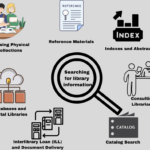A research question serves as the guiding beacon in the vast sea of inquiry, illuminating the path for systematic investigation. It is the essential core of any research endeavor, providing clarity and direction to the researcher’s journey.
Often emerging as the very first step in a research project, the research question is the pivotal point of interrogation that shapes the entire scope of the study. It not only sets the rhythm and tempo for the work ahead but also establishes a framework within which the researcher will operate.
Typically, a well-crafted research question hones in on the essence of the investigation, influencing everything from the chosen methodology to the formulation of hypotheses. It acts as a compass, steering all phases of inquiry, analysis, and reporting. With well-defined research questions, a researcher can uncover valuable insights and gather significant information, enriching the overall understanding of the topic at hand.

Methods of Research Question
Crafting an effective research question involves clarity, precision, and depth. Here’s a dynamic approach to guide you through the process:
1. Begin with your topic: Identify the broad area that captivates your interest—what ignites your curiosity?
2. Hone your focus: Delve into a specific aspect, challenge, or ongoing debate within your chosen realm, narrowing your vision to allow for a detailed exploration.
3. Transform it into a question: Articulate your inquiry in a way that opens the door to discovery, encouraging investigation rather than yielding a simple yes or no answer.
4. Ensure specificity: Employ precise and unambiguous terminology so that the essence of your investigation is crystal clear.
5. Confirm its research viability: Verify that the question allows for ample resources and information to be gathered for a thorough examination.
Sample formula:
> “How/Why/What does [subject] affect/influence/relate to [aspect] in [context]?”
Examples of compelling research questions:
– How did the architectural design of the Ashurbanipal Library mirror the formidable political landscape of the Assyrian Empire?
– Why did early libraries predominantly curate religious and administrative texts, and what does this reveal about the society of the time?
– What intricate factors led to the catastrophic downfall of ancient Mesopotamian libraries, and how did this loss impact cultural heritage?
This approach invites you not just to ask questions, but to embark on a journey of discovery and understanding.
Constructing Research Questions
Formulating a research question marks a pivotal stage in the research process—a foundational step that sets the stage for everything that follows. When embarking on this investigative journey, researchers should consider several key points to effectively shape their questions.
1. A genuine interest in or a solid grasp of a particular subject can serve as a powerful catalyst in the quest to construct a meaningful research question (Farrugia, 2010). This passion not only fuels the researcher’s motivation but also enriches the inquiry with depth and insight.
2. The formation of the research question is intricately linked to the type and scope of information the researcher aims to gather. It acts as a compass, directing the researcher’s focus and influencing the pathways explored in their investigation (Creswell, 2014). Each question inherently shapes the landscape of inquiry, setting boundaries on the vast ocean of potential knowledge.
3. Selecting a research question is not just crucial; it is the heartbeat of both quantitative and qualitative research. In some instances, it takes precedence over the creation of the conceptual framework of the study. In all cases, it illuminates the theoretical assumptions within that framework, clearly articulating what the researcher seeks to uncover most fervently.
4. Finally, the research question must be crafted with precision and clarity. It should be robustly supported by relevant literature as discussed in the literature review, creating a solid foundation upon which the entire study can stand confidently. A well-defined question not only guides the research but also fosters a deeper understanding of the inquiry at hand.
Characteristics of Good Research Questions
Crafting a compelling research question is essential, and there are four pivotal characteristics to consider:
1. Feasibility
A well-formulated research question must be practical and achievable within the constraints of time, resources, and expertise. It should allow the researcher to gather meaningful data and derive insightful conclusions without becoming an overwhelming endeavor.
2. Clarity
Clarity is paramount in a research question. It should be articulated in a straightforward manner, free from ambiguity and vague terminology. A clear question guides the direction of the research and ensures that everyone involved understands the focus of the inquiry.
3. Significance
An impactful research question carries weight; it is pertinent and relevant to the chosen field of study. It should contribute to existing knowledge, addressing gaps in research and offering potential for further exploration within the specific topic, sub-field, or domain.
4. Ethical Considerations
The ethical implications of the research question must never be overlooked. It should respect the rights and dignity of all participants, ensuring their anonymity and securing informed consent. Following ethical guidelines fosters trust and integrity in the research process.
By embodying these characteristics, research questions become powerful tools that guide inquiry and contribute to the advancement of knowledge.



